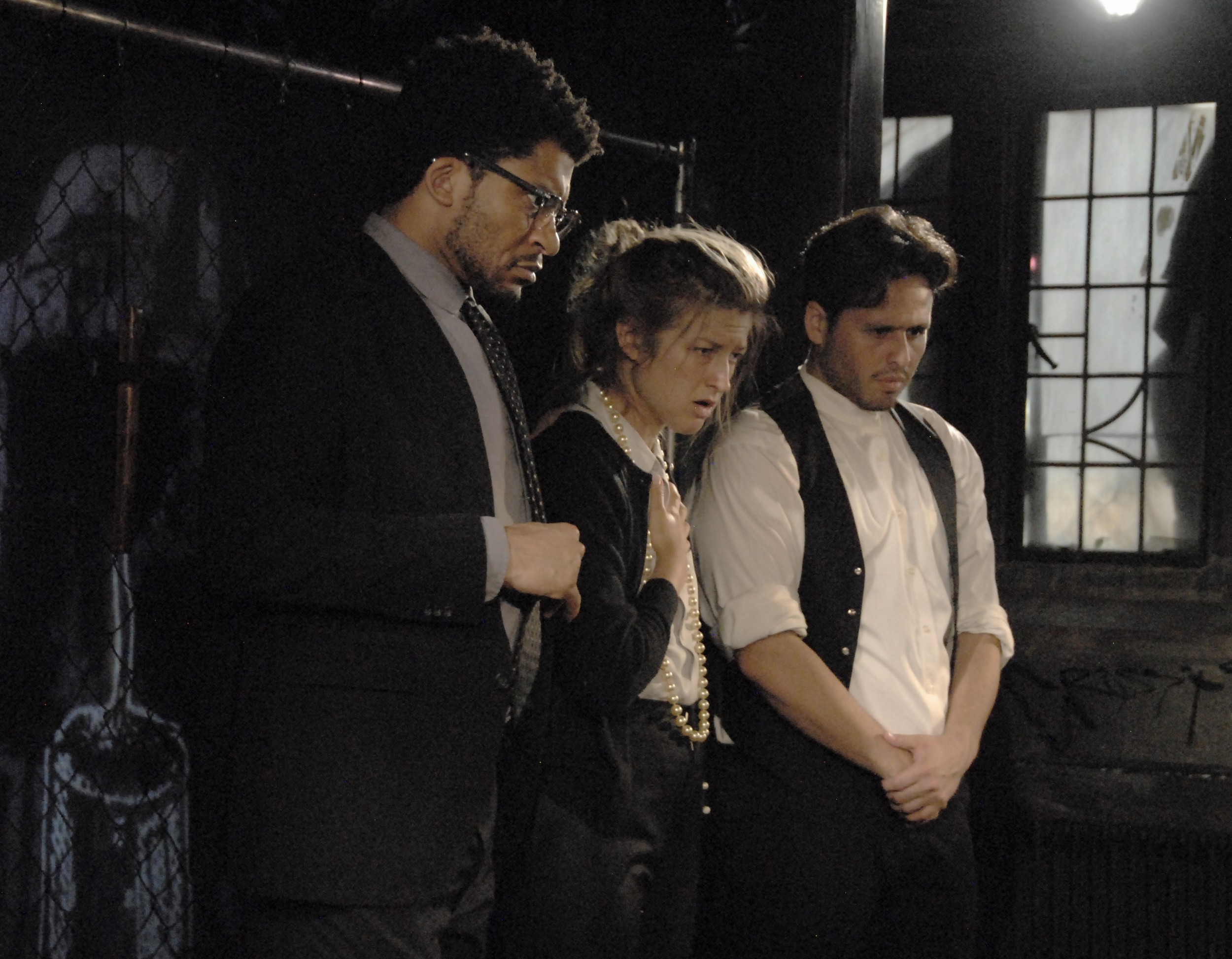Preview of the Carlotta Festival of New Plays, Yale School of Drama
A West African folktale with a Brechtian treatment; a story of inter-generational intimacy set in the great wide open of Alaska; a revisiting of Shakespeare’s The Merchant of Venice from the view of Shylock’s daughter—these are the new offerings to be seen at the 12th annual Carlotta Festival of New Plays, a theatrical tradition of presenting new work from Yale School of Drama students at the end of their three-year stint in the playwriting program. The three playwrights—Tori Sampson, Miranda Rose Hall, Sarah B. Mantell—are paired with graduating directors—Elizabeth Dinkova, Kevin Hourigan, Jesse Rasmussen, respectively—to bring their plays to the stage at the Iseman Theater, featuring casts drawn primarily from first and second-year actors in the program.
Tori Sampson
Tori Sampson’s play, If Pretty Hurts Ugly Must Be a Muhfucka, subtitled “an understanding of a West African folktale,” draws on a story Sampson was first told as a child by an uncle, “The Beautiful Girl and Her Seven Jealous Friends.” The story treats beauty as a determining factor of social standing. Sampson, who was a student of sociology before becoming a playwright, sees the story as a way to speak to women today when some standards may have changed, to some extent, but not for all.
The play could be said to come out of a frustration with double-standards, not only about who can be beautiful in a racist world, but also about what stories get told by the dominant culture. Sampson said she was “frustrated early on” in her studies at the School of Drama because the canonical playwrights were all white and male. One such writer was Bertolt Brecht and Sampson gradually decided to “investigate what I was not drawn to,” finding a certain common currency in the way Brecht’s work incorporated folk tales and what he found useful in other sources. For Sampson, the task of recreating other’s material “leads to a shared knowledge” and a way of interrogating what is known. As artists, Sampson said, drama students have “to allow ourselves to criticize what we study.”
The setting of Sampson’s play is a fictional place, Affreakah-Amirrorkah, a name that suggests a “freaky mirror” of Africa-America, and uses what might be called an Americanized dialect. It’s a poetic language relying on rhythm and sound more than everyday speech does. Last year, Sampson co-authored a Carlotta play with Jiréh Breon Holder, Some Bodies Travel, a very entertaining challenge to black cultural stereotypes, and in the Yale Cabaret season she directed Tarell Alvin McCraney’s reworking of Yoruba folk material, In the Red and Brown Water.
Plays, Sampson said, “are not about solving issues.” The issue of beauty, which our culture treats so seriously, she said “intrigued” her and she sees her play as “adding to the conversation” about what our standards say about us as a culture.
In choosing a play for this year’s Carlotta, Sampson was asked: “What is going to make you most happy?” One thing that gives her joy is making people laugh, and hers is a comic play, with jokes that may be “in your face,” but which should connect with a contemporary audience. Laughter and meaningful themes go hand-in-hand, for Sampson, and working with dramaturg Catherine Maria Rodriguez and director Elizabeth Dinkova, whose work has been marked by both, has been a positive experience for all.
Miranda Rose Hall
The plays by Miranda Rose Hall that have been seen at YSD have tended to be comic, with decidedly satiric elements. But there’s another side to her work—more than two, in fact. Hall’s The Hour of Great Mercy allows her to move into domestic drama, in this case set in remote, rural Alaska, and to examine a key theme for her: “the nature and limits of love”
The play is based on a setting where Hall lived for a time, working in a care-giving facility she was assigned to through “a kind of domestic Peace Corps.” Her task was providing company and solace to people near the end of their lives. Her play allows Hall to look back at a place that, she said, is with her always, with its mix of “sublime environment and human dysfunction,” a combination she just had to write about. Hall’s play creates a situation to examine questions that loom large at the end of life, like “forgiveness, and the ways in which we love each other and suffer with another’s suffering.”
The story occurs five years after a tragic event in the community of Bethlehem, Alaska, where Ed, a Jesuit priest in late middle-age, returns to reconcile with his estranged brother and finds himself falling in love unexpectedly in the isolated wastes. For Hall, the play is “irreducibly Alaskan” because her time there, in which she drank up many stories from the locals, most having to do with “a wild cast of characters in spartan conditions,” caused her to reflect on questions of “survival and the ethos of mortality.” The landscape, she said, made her feel “in the presence of something greater” that was “impossible to ignore.”
Choosing a Jesuit as hero for her play is a testament to the Jesuits who ran the volunteer corps Hall joined, and it also was a way to work with Catholic themes. Though raised Presbyterian, Hall is descended from Italian immigrants, and said she feels “culturally Catholic.” Georgetown, where she received her undergraduate degree, was founded by Jesuits and their stated values of “service, education, and justice” are important to Hall. It’s also important that the play be set during the papacy of a former Jesuit priest: Pope Benedict, who denounced gay marriage.
Though ultimately fictional, the play draws on Hall’s real love for Alaska and the people she met there. Though no one who knew her could quite understand why she was going with a small team of total strangers into one of the remotest and wildest states in the nation, her experience has made her more confident about her ability to find the themes she wants to explore in her art. The characters in The Hour of Great Mercy are not Alaskan natives but have lived there a long time, and reflect for Hall “the heart, humor, and tough defiance” of the people she came to know there. Kevin Hourigan and Gavin Whitehead, Hall’s director and dramaturg, were her first collaborators in her first year project at YSD, so, in a way, she’s come full circle.
Sarah B. Mantell
Kevin Hourigan’s second-year studio show, Shakespeare’s The Merchant of Venice, figures as a major catalyst for the third Carlotta play. In viewing that production, Sarah B. Mantell finally saw a play she had always avoided, not wanting to experience a Jewish villain given canonical weight by the greatest writer in the English language. Mantell began writing Everything That Never Happened last summer, making this “the shortest possible process” in bringing a play to the stage. The play, she said, “could only be born at the Yale School of Drama” because she would not have encountered Merchant anywhere else. What’s more, Hourigan’s production, which featured Elizabeth Stahlmann in the key role of Shylock, staged the humiliating conversion scene that the Jewish merchant is condemned to undergo.
And yet Merchant is considered a comedy and Mantell sees the relation of humor to tragedy in the play as “very Jewish,” and that has motivated her to write with Jewish speaking voices, to create, in fact, “everything that never happened” in The Merchant of Venice. Particularly, Mantell’s play dramatizes the story of Shylock’s daughter Jessica, in love with Lorenzo, who realizes she must run away. A key plot point is that she is ethnically ambiguous and can pass as something she’s not—a gentile.
In pursuing her process of “taking Shakespeare’s characters and making them my own,” Mantell had conversations with playwright Sara Ruhl who has adapted classic texts, such as Virginia Woolf’s Orlando, in her work. Mantell cites as well Paula Vogel’s Desdemona: A Play About a Handkerchief, a reworking of Othello with a very different emphasis. Mantell has also been working on a play called “Fight Call”—the term for working through all of a play’s fights in sequence for rehearsal—that would be a walk-through of the deaths of many of Shakespeare’s female characters. The key element uniting such reinventions of Shakespeare is considering how the sexist assumptions of his plays can be overturned or dramatized.
Everything That Never Happened wants to take such revisionism a step further. Not only is Jessica a female hero for this reworking of Merchant, but she is also ethnically other than the dominant culture. Working with Jesse Rasmussen, who staged the violent misogyny of ‘Tis Pity She’s a Whore as her thesis show, has “been tremendous” for Mantell, as “Jesse can do a lot with little,” and her dramaturg, Chad Kinsman, and others she consulted have been incredibly helpful in keeping straight details of the time period and other factors relevant to the adaptation.
Mantell, whose early play, Mrs. Galveston, was one of the most engaging plays at this season’s Yale Cabaret, may find at last the heart of Shakespeare’s always somewhat problematic Merchant.
Three graduating playwrights, three new plays with heart, humor, and new perspectives.
The Carlotta Festival of New Plays
Yale School of Drama
If Pretty Hurts Ugly Must Be a Muhfucka: an understanding of a West African folktale
By Tori Sampson, directed by Elizabeth Dinkova
May 5, 8 pm; May 9, 8 pm; May 11, 2 pm; May 12, 8 pm
The Hour of Great Mercy
By Miranda Rose Hall, directed by Kevin Hourigan
May 6, 8 pm; May 10, 2 pm; May 11, 8 pm; May 13, 2 pm
Everything That Never Happened
By Sarah B. Mantell, directed by Jesse Rasmussen
May 7, 8 pm; May 10, 8 pm; May 12, 2 pm; May 13, 8 pm



























